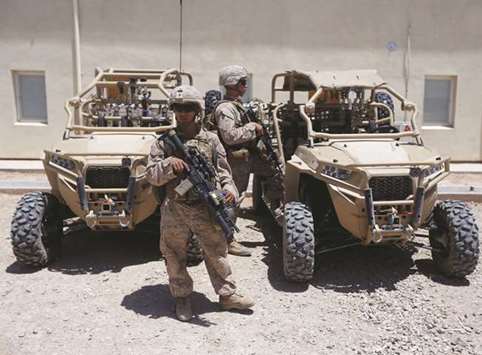War crimes prosecutors have delayed a decision on whether to launch a full-blown probe into crimes committed in war-torn Afghanistan following “substantial” new information from Kabul, their office said yesterday.
The move comes after Kabul responded to a call by the International Criminal Court’s prosecutors asking for more information about possible crimes committed by Taliban, Afghan government and US military forces — including the CIA — since the US-led invasion more than 15 years ago.
“The report triggered reaction, notably from the government of Afghanistan, which subsequently submitted substantial information to the (prosecutor’s) office earlier this year,” the prosecutors said.
“The information requires careful review by the office, which is currently ongoing,” they added in an e-mail sent to AFP.
Once the review is completed, ICC chief prosecutor Fatou Bensouda “will make a final decision” on whether to ask judges to authorise a full-blown investigation.
Bensouda said in November her office was “concluding its assessment” and that a decision on whether to ask the ICC’s judges to open a full-blown probe was “imminent”. She said US forces may have committed war crimes in Afghanistan by torturing prisoners in what may have been a deliberate policy.
She stressed the Taliban militia and the affiliated Haqqani network, Afghan government forces and US troops as well as the CIA all appeared to have carried out war crimes since the Islamic militia was ousted by a US-led invasion in 2001 which followed the September 11 attacks that year.
And Bensouda blamed the Taliban and its allies for the deaths of some 17,000 civilians since 2007 to December 2015 in a brutal insurgency with “numerous attacks” on schools, hospitals and mosques.
However, the prosecutor’s office yesterday emphasised that their review of the new information “will not take longer than is required for a thorough internal assessment”.
“The prosecutor is committed to arriving at a final determination without further delay following this requisite process,” her office said.
Afghanistan is experiencing a wave of intensified violence, with the United States considering sending more US troops to shore up its presence.
The American military in Afghanistan says it will delay announcing troop casualties until after next of kin have been notified, potentially leaving casualties unreported for days.
The change in policy was instituted by General John Nicholson, the senior US commander in Kabul, over fears that families could be left guessing for days after casualties were announced but not identified and before families could be notified, said military spokesman Captain Bill Salvin.
“It’s a balance we’re trying to strike between trying to provide all the support we can to families, while also informing the public,” he told Reuters.
Previously, the US military command in Kabul issued a initial announcement only stating that a soldier had been killed, often including a general location within Afghanistan, but not identifying him.
Once the soldier’s family or next of kin had been notified, the Pentagon would release more details, including names and home units.
The change in policy was revealed this week when US Army Private First Class Hansen Kirkpatrick was killed in Afghanistan’s Helmand province on Monday, but officials did not announce that a soldier had been killed until Wednesday, when his death and identity was released.
A Pentagon spokesman confirmed that the policy only applied to Nicholson’s command, leaving other war zones like Iraq or Syria guided by the usual US reporting requirements.
Military spokesmen in Afghanistan would continue to release casualty reports, albeit on a more delayed schedule, Salvin said.
“There might be a bit longer period before we report it,” he said.
About 13,000 US and allied troops in a Nato-led force are deployed in Afghanistan to train and advise the security forces fighting Taliban insurgents.
More than 3,500 of the coalition troops have been killed since the fighting began in late 2001.
Several thousand additional American forces operate in a separate counter-terrorism mission in the country. Kirkpatrick was part of that mission.
Salvin said the US military would still respond to public reports of casualties, as occasionally happens when Afghan officials report casualties among foreign troops.

US Marines keep watch while others attend training with Afghan National Army (ANA) soldiers in Helmand province, Afghanistan.
